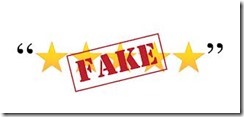
Fake product reviews and sites next in line for ACCC crackdown
By mike, Dec 14 in blog with 0 commentsOne area of Internet marketing we constantly get asked about by our clients is negative reviews of their products on review forum sites. As these sites tend to have a high organic search result in Google they often rank higher or just below the company themselves, and if the review is negative and there are a few of them from disgruntled customers, it can affect not only the On Line reputation of the company but also sales.
We are often asked to remove these from the search results, and of course that is easier said than done. The best form of defence is not to have the bad reviews there in the first place, but lets ask a question, how many of them are actually genuine reviews?
Are you asked for a proof of purchase before your review is accepted? do you check the email addresses or user names of the people writing the review?
I know of one client where the negative reviews, which resulted in a poor star rank, was actually caused by a competitor leaving bad reviews under assumed names, this is really a form of commercial sabotage.
So where is the policing of these reviews? in the more traditional media, an editor will first audit the review and then decide on wether to publish. That process is given lip service with the forum sites, and as long as you don’t defame the company your review seems to be freely published.
I’ve never been contacted by any review site either before or after a review has been published, to ascertain the genuineness of my review, even to find out if I’d ever actually used the service or product, the assumption is I have.
As a frequent traveller, I will often look at customer reviews of hotels or resorts to make decisions on wether I’ll use them for accommodation or travel, and often have changed my selection based on other peoples reviews. But how do you really know they’ve actually been there?
Of recent times, I’ve become very suspicious of reviews and now research more thoroughly before making my choice.
It’s about time that the ACCC is now looking into this, it has the ability to impact on small business in a big way, it’s hard enough for small business to compete for clients in the current economy, and the last thing they need is this impacting on their business.
If you are interested in the actual story, I’ve included it below for you to read:
“Businesses have been put on notice after the competition watchdog warned it will be cracking down on fake product reviews and online voucher rip-offs in the new year.
Following a spate of complaints about businesses taking advantage of customers or other companies, the Australian Competition and Consumer Commission has changed its focus.
While it will continue to scrutinise door-to-door selling – which led to fines of $1 million this year – a number of other issues have come to the fore.
According to ACCC chairman Rod Sims, fake online reviews have emerged as an issue as reviews become increasingly popular among consumers.
"Companies [are] either making [them] up themselves or getting other people to make up positive reviews," Sims told News.com.au.
"Sometimes Blind Freddy can see what’s going on, but sometimes they are more subtle."
The ACCC will also investigate group buying – which attracts around 140 complaints every month – and will continue to scrutinise companies that dodge consumer guarantees.
It will also maintain its special carbon tax taskforce, although Sims admitted carbon tax complaints "have slowed to four or five a day".
The announcement comes one week after the ACCC released a free app to provide consumers with instant advice while they are out shopping.
According to ACCC deputy chair Delia Rickard, the app will "help to take the worry out of Christmas shopping".
"Simple disputes over returns, refunds or replacements often leave shoppers confused about their rights," Rickard said in a statement.
"The app answers commonly asked questions about refunds, returns, warranties, and lay-bys, such as ‘What do I do if a product is faulty?’ and ‘What happens if I don’t have a receipt?’.
"The app will allow consumers to store photographs of receipts as proof of purchase on their smartphone or tablet at the point of sale.
"Keeping your proof of purchase and checking the store’s returns policy if you have simply changed your mind can be important."
Rickard pointed out the Australian Consumer Law provides stronger protections against faulty products, often allowing for repairs, replacements or refunds outside of a manufacturer’s or retailer’s warranty period.
"If products don’t work as promised or don’t work at all, you have rights as a consumer regardless of whether you bought it online, in a shop, full price or on sale," she said.
"The app explains the steps to take when enforcing these consumer rights."
The app also has a "My items" feature, which allows consumers to set reminders for when lay-bys are due, and the expiry date for warranties and gift vouchers.
It also explains common labelling terms like "Made in Australia".”
This article first appeared on StartupSmart.























Leave a Comment